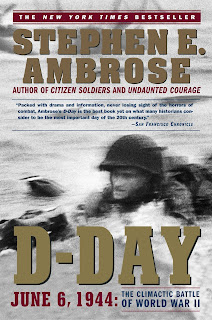History Strikes Again!
I read a lot. Not like a book a day, but generally a couple of books a month. I suspect all authors do. And like I've said before, I read differently now, with more attention to writing style and technique. I try to vary what I read: fiction and non-fiction, different authors, and my tradition of a winter classic. I sprinkle in a curveball every now and then, like some young adult fiction or books on how to be a better writer. Hopefully it's good for me. I know the variety keeps me interested.
Thing is, I don't win 'em all. Mostly, if I get a few chapters into a book and I don't like it, I move on to something new. There are a lot of books out there and I realize I don't have time to waste reading ones I don't like. Of course, with some of them, somebody must like them because they're best sellers and some have become blockbuster movies, but what do I know.
A month ago, I read two books, neither of which were great. They were OK, and I finished them, but they left me uninspired. So I decided to go for a 'sure thing," a book I was sure I'd like. I chose Stephen Ambrose's book, "D-Day." He's a fabulous writer with impeccable credentials and I've read (and enjoyed) several of his other works. And c'mon it's D-Day!
Anyway, his book overwhelmed me, which doesn't happen often. Unless one uses a map of Normandy as a bookmark and makes notes of who's in what unit at what time, the book was just chaos. When it's described as "the definitive history of WWII's most pivotal battle," they weren't kidding. I didn't look, but he interviewed probably hundreds of veterans and read the papers of hundreds more. From the minds of Eisenhower and Rommel to privates on Omaha Beach, he certainly can't be accused of going halfway. In short order, I just tried to focus on the little bit in front of me.
But maybe that was his point? D-Day was a gigantic endeavor and chaos would be a polite way to describe vast portions of it. He references (as do most historians) that all most soldiers could do was focus on what was in front of them. That I couldn't keep track of who was what and where actually helped me understand the battle a bit better.
I came away with a couple of thoughts, of course. First, what won the battle for the allies was that our citizen-soldiers were able to make decisions on the battlefield when their plans went out the window. The Germans couldn't. They had to wait for orders from Berlin, and since Hitler was sleeping 'til noon that day... Yep, the battle was won because ordinary guys did extraordinary things that day. That we simply had more planes, ships, and guns certainly helped, but those were just tools for our guys to use.
Along with that, simple motivation. The US soldiers wanted to go, stop Hitler's madness and go home. The Canadians and the British had that and some payback to deliver. The French and all of our other allies, all of that, plus get their country back. The Nazis had their love of Hitler and lust for power and that was it. It was nice to see the good guys win!
The last thing that struck me was an observation Mr. Ambrose made about the Congressional vote to proceed with a court-martial against a general and an admiral to fix blame for the Pearl Harbor attack. The Democrats (who opposed the bill) delayed the vote for two years, charging that it was a Republican effort to create a campaign issue out of embarrassing President Roosevelt. The Republicans charged the Democrats were trying to delay any disclosures until after the election. To quote Mr. Ambrose, "Both charges were true.
So 2 1/2 years after Pearl Harbor, in the midst of the invasion of Europe, the two political parties were back home trying to make political hay out of the investigation. Huh, sounds like that could have been written today. Like I've said, I look for these bits of wisdom for my own knowledge and sometimes to write about. I just wish I didn't have so many good examples.



I've read this as well, but it's been a while. What struck me was the sense of honor almost all the officers showed. A commitment to inspire and lead by example. It really was a terrific book that far exceeded my expectations when I picked it up. And you're right, the depth of research was astounding.
ReplyDelete